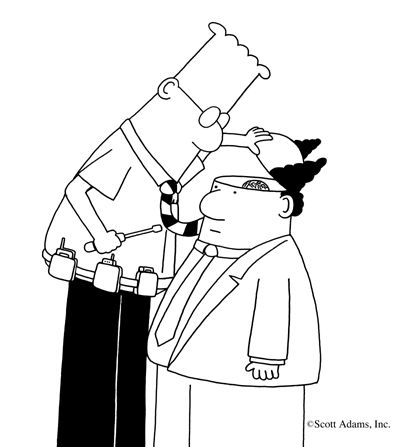What is your Dilbert Index? It’s More Important Than You Think
Organizational culture is one of those items that you can’t describe what it is, but you know when it’s broken. In the 7 Immutable Laws of Innovation, the Law of Culture states: Establishing and nurturing an innovation culture sets the foundation for the organization. For leaders it means rewarding

Organizational culture is one of those items that you can’t describe what it is, but you know when it’s broken. In the 7 Immutable Laws of Innovation, the Law of Culture states:
Establishing and nurturing an innovation culture sets the foundation for the organization. For leaders it means rewarding the right behavior (teamwork, collaboration, honesty, trust) and identifying and eliminating bad behavior (not-invented-here, passive/aggressive, turf battles). The key items in a robust culture of innovation are:
People: Every person feels ownership of the innovation agenda and is equipped and skilled to have impact.
Ideas: Ideas are actively solicited from all sources, valued, and nurtured not criticized or minimized.
Alignment: All resources are aligned against the innovation agenda to ensure everyone is pulling the same direction.
Communication: Communication that is clear, honest, respectful and transparent is essential for teamwork and establishing trust within the organization.
One of the fastest ways I've found to take the temperature of the organization culture is to track what I call the “Dilbert Index”.
This is the growth in the number of Dilbert cartoon’s that are posted around the office. If the number stays flat, then things are stable, but if you see a sudden burst of cartoons popping up, then take notice. The team is signaling to others and to management that there are issues frustrating them. David Packard was once overheard saying, “A frustrated employee is a greater threat to the organization culture than merely an unhappy one”.
When management uncovers these frustrations, what should they do? Run them to ground. Dig in and understand if there are real issues or if this is a one off problem. In either case, deal with it. If you don’t, small frustrations begin to chip away at the corporate culture and before you know it, it’s destroyed.
So what are the characteristics of a healthy culture?
- Acceptance and appreciation of diversity
- Regard for and fair treatment of each employee as well as respect for each employee’s contribution to the company
- Employee pride and enthusiasm for the organization and the work performed
- Equal opportunity for each employee to realize their full potential within the company
- Strong communication with all employees regarding policies and company issues
- Strong company leaders with a strong sense of direction and purpose
- Lower than average turnover rates (perpetuated by a healthy culture)
- Investment in learning, training, and employee knowledge
How does your organization stack up?
Other posts on the 7 Immutable Laws:
Phil McKinney Newsletter
Join the newsletter to receive the latest updates in your inbox.




